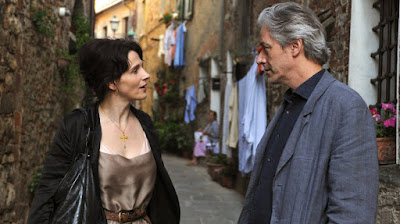If you want to talk about a movie that was totally misrepresented by its trailer, look no further than Certified Copy (2010, directed by Abbas Kairostami). If the trailer was to be believed, this was some kind of romantic ode tour of Tuscany, where a couple rediscovers their marriage. While there's certainly an element of that, that's SO not what this movie is interested in.
I haven't had a good experience with Kairostami, who is one of the major figures in world cinema these days. I hated his Palm d'Or winner, A Taste of Cherry, and I was indifferent to Where is the Friends House and The Wind Will Carry Us. I haven't seen Close-Up, the film that most of my movie friends call his masterpiece, but I know what it is. Enough for it to inform my reaction to Certified Copy, along with my negative reaction to A Taste of Cherry. Kairostami's subject matter is the cinema itself, though he couches it in small stories in the best tradition of Iranian cinema. In A Taste of Cherry, Kairostami denies the audience most of the pleasures the cinema sees fit to provide, including suspense, visual interest, character, resolution. As if to punctuate it, the director gives the audience a snippet of St. James infirmary over an end credit sequence that pulls back the veil to reveal the film crew packing up and going home. It struck me as table scraps. Close-Up (which, again, I haven't seen) is totally meta, in which the director completely obliterates the border between fiction and documentary. Basically, Kairostami doesn't trust the film image to tell the truth, and he likes to examine this in his films.
Certified Copy begins with an English writer who is promoting his new book in Tuscany. His book is about the value of copies as opposed to originals, and its major thesis is that if a copy is identical to an original, doesn't it have the same value? In the audience is a French antique dealer who takes the writer on a tour of the countryside. At some point, they're mistaken for a married couple whose marriage is deteriorating. The two begin to play act the part, and as the movie unfolds, it becomes more and more unclear whether they ARE play-acting or whether they are a married couple. The movie is mum on the point, and it leaves it for the audience to piece things together in light of the notion that if it seems real, then isn't it real? Is the copy the same as an original?
Unlike A Taste of Cherry, this movie pours on the pleasures of cinema, whether it's the Tuscan countryside or the big-time movie star (Juliette Binoche) or the dramatic scenes, but it's equally suspicious of their value. It gives them to the audience and asks them if they believe them. More than one critic has suggested that Binoche's performance here is deliberately actor-ish, going well beyond the needs of the plot and into a kind of meta performance. I can't really speak to that, because I'm a horrible judge of performances when they're not in English (though great whacks of this film are in English). Kairostami gradually confronts the viewer with the actors by increasingly filming them in intimate reverse shots in which they gaze directly into the camera as they speak, daring the audience to catch them out as they ramp up the emotion. In one particular scene, Binoche appears to be putting on a made-up game face as she gears up for the thespian fireworks. This is a tell, I think, but the movie is full of tells and interpreting them is the fun of the movie.

Meanwhile, the background is littered with the impedimenta of marriage itself. If they behave as if they're married, does it matter if they are or not? By inference, can we trust the filmmakers to clue us in? These are the questions the film raises, and it seems that merely raising them is the point. It's a deliberate challenge to the audience to examine their assumptions about cinema itself, all the while seducing them with the very means with which the cinema is known to lie and manipulate. It's an interesting dialectic, sure, and I think it's more or less successful here because the movie provides more sugar than poison. This is an intellectual movie--a puzzle movie, actually--but it provides plenty of emotionality if an audience wants it, even if that emotionality is suspect. Hey, a copy's as good as the real thing, isn't it?

















No comments:
Post a Comment